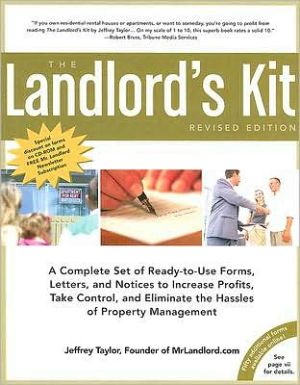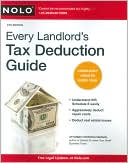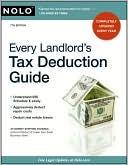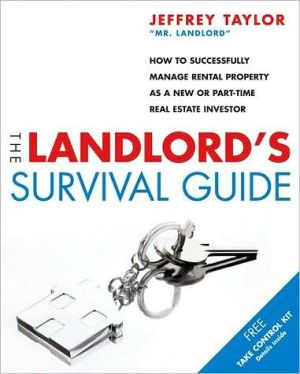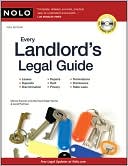Weekend Landlord with CD, 2E: From Credit Checks to Evictions and Everything in Between
It Doesn't Have to Be a Full-Time Job\ The Weekend Landlord is your simple guide that highlights the crucial areas of landlord/tenant relations. Complete with frequently needed forms and helpful checklists, you can find the best tenants, handle any issues that come up and move on to the next tenant as circumstances demand.\ Manage Your Money Make smart decisions in selecting tenants, collecting rent, reporting income and saving at tax time.\ Watch Out for Red Flags Avoid the common mistakes...
Search in google:
Includes the forms you need on CD-ROM.
The Top 10 Ways to Be a Successful Landlord\ Excerpted from The Weekend Landlord, 2E by James A. Landon ©2007\ 1) Require a complete rental application Many tenancies do not have a happy ending. Perhaps the tenant needs to be evicted, or a landlord discovers extensive damage to the dwelling after the tenant has moved. In the event that a tenant leaves with money owed, the original rental application becomes very important. A landlord stands a much greater chance of recovering money owed if the application includes accurate Social Security number, date of birth, employment, income, reference, and nearest relative information. All of this information can help landlords in their efforts to recover past due amounts from a former tenant.\ 2) Inspect a dwelling before a new tenant moves in Failing to properly document the condition of your property before your tenant moves in can adversely affect your ability to demonstrate that a tenant is responsible for damages caused during a tenancy. If you have not documented the condition of the property prior to move in, how can you prove that the tenant caused the damage? Shooting video, taking pictures, and keeping thorough notes of the condition of the property prior to move in greatly enhances your chances of recovering for damages caused during the tenancy.\ 3) Always obtain the forwarding addresses of your tenants There are a couple of reasons that a landlord should always obtain this forwarding address information: 1) to ensure that there is an address to send information regarding the tenant's security deposit, often required by state statutes; and 2) to give the landlord the tenant's new address in the event the landlord needs to pursue the former tenant for money owed in excess of the deposit.\ 4) Inspect the property during the course of the tenancy Although the tenant occupies the property, the landlord still is the owner. Therefore, it is in the landlord's best interests to regularly inspect the property. Even though the rent may be paid on time, tenants may be damaging or neglecting the property, and this can cost the landlord far more than a month or two of unpaid rent.\ 5) Insist on a signed agreement as to the date that the balance is due when accepting a partial payment The temptation to accept past due monies from a tenant is understandable, even if it is not the full amount due. If you accept partial payments, however, it is always a good idea to document the amount of money received, and have the tenant sign the document specifying the date that the balance will be paid. In many jurisdictions, a landlord will be forced to wait until the following month to bring an eviction action if he or she has accepted a partial payment without a written agreement regarding the date that the remaining balance is due.\ 6) Be familiar with local and state landlord/tenant and fair housing laws Quite often, inexperienced landlords unknowingly and unwittingly violate local, state, and federal laws without having any idea that they are doing so. Such violations can be costly, so landlords need to keep abreast of the current laws to the best of their ability. There are numerous ways in which landlords can keep current with the law, including the Internet, library, and secretary of state-not to mention having an experienced landlord/tenant attorney to contact in a pinch.\ 7) Be familiar with market conditions Market conditions exert a great deal of influence over residential rental properties. These conditions affect such things as the amount of rent that is attainable, the value for sale of any rental property, and the long-term outlook of a rental property as a potential investment. It is of great benefit to always keep up with your local market conditions. Periodically research advertised rents. Drive around and see what types of units are available, and what the asking price is for those units. Periodically check the asking price for available properties similar to yours. All of this research, which will encompass a minimal amount of time, will pay dividends down the road.\ 8) When it is time to hire an attorney, hire an attorney A primary purpose of this book is to provide landlords with the information necessary so that retention of an attorney is unnecessary. Sometimes, however, landlords do get in over their heads, and it is important to know when it is time to step back, evaluate the situation, and realize that you need professional guidance or representation. If you get to the point where court action seems imminent or inevitable, it is probably time to give a landlord/tenant attorney a call.\ 9) Whether or not you think your tenant is entitled to any return of a security deposit, account for that money in a security deposit reconciliation statement Many landlords want nothing to do with their former tenants, particularly if they believe that those former tenants have caused substantial damages to the property. Even if you believe that your tenant has committed damages that far exceed the security deposit, account for the deposit and those damages in a written deposit reconciliation statement. Many states contain statutes harshly penalizing landlords for improperly accounting for security deposits, particularly if a judge finds that monies have been wrongfully withheld. Therefore, even if you are absolutely convinced that a tenant has no right to the return of any portion of the deposit, account for those monies anyway.\ 10) Keep tabs on your property manager One of the reasons that you might hire a property manager is on the presumption that the property manager is well versed in the law, and better able to protect your interests. You may be right. However, property managers are not attorneys, and the burden of any mistakes will primarily fall squarely on your shoulders. Keep in regular contact with your property manager and review your client records often. Regular contact allows you to help your property manager do his or her job most effectively.
How to Use the CD-ROM -Introduction -Top 10 Ways to Be a Successful Landlord-Chapter 1: Before a Tenancy Begins -Advertising Rental ApplicationsCredit ReportsCosignersFair Housing ConsiderationsProtections for Those with DisabilitiesUnintentional DiscriminationPotential Penalties for Discrimination ClaimsChapter 2: The Rental Agreement or Lease -Terms of the AgreementOral Rental AgreementsLiquidated Damages Provisions DisclosuresBlank SpacesProhibited ProvisionsImplied ProvisionsChanges to the LeaseMinorsLease ExpirationChapter 3: Security Deposits -Wear and TearRefundable vs. Nonrefundable Deposits Move-In InspectionAppropriate DepositAccounting for DepositsDeposits Wrongfully Withheld Property Sold During the TenancyChapter 4: Rent -Rent ControlReceipts for RentDrop BoxesNonpayment of RentAmount and Calculation of Late Fees Other FeesPartial PaymentsInsufficient Funds Checks Raising the RentChapter 5: The Landlord's Duties -Duty to Deliver Possession to Tenant Moving In a Tenant ChecklistDuty to Maintain Fit PremisesYour Tenant's Right to Withhold RentDangerous Conditions and WasteHazardous ConditionsLead-Based PaintAsbestosMoldCarbon MonoxideRadonSmoke DetectorsOlder StructuresPeaceful and Quiet Enjoyment of the Premises Landlord's Right of AccessDuty to Provide a Safe Environment Property ManagersInsuranceLimiting the Landlord's Duties Selling the PropertyGeneral Monthly Duties of a LandlordChecklistChapter 6: Your Tenant's Rights, Remedies, and Duties -When a Tenant can Employ a RemedyProper Notice of Material Breach from Your Tenant Accompanying DocumentationTenant's ActionSelf-Help RemediesProblems Between Cotenants Home-Based BusinessAssigning the Lease SublettingTenant's GuestsDuties Regarding RoommatesChapter 7: Terminating the Tenancy -Move-Out InspectionDeath of a TenantActive Duty Military PersonnelFire or Casualty DamageAbandoned PropertyRetaliationMoving Out a Tenant ChecklistChapter 8: Evictions and Collection Actions -Locking the Tenant Out or Turning Off UtilitiesThe Need for an AttorneyFinding the Right Attorney for YouMaterial and Irreparable BreachWritten NoticesMaterial NoncomplianceNotices for Material NoncomplianceForcible Entry and Detainer ActionsThe ComplaintBankruptcy ConsiderationsPost-Tenancy Lawsuits and Collection ActionsRecording Your JudgmentEvicting a Tenant ChecklistChapter 9: Accounting and Tax Considerations -Schedule EPassive Income and LossesCapital Gains Taxes1031 ExchangesSole Ownership and Entity FormationBusiness DeductionsLandlord ChecklistGlossary -Appendix A: Landlord Checklist -Appendix B: Rent Control Laws -Appendix C: Notice to Terminate a Month-to-Month Tenancy (State by State) -Appendix D: Security Deposit Limits (State by State) -Appendix E: Time Frames for Providing Security Deposit Statements (State by State) -Appendix F: Time Permitted for Rent to be Paid after Nonpayment of Rent Notice (State by State) -Appendix G: Notice Requirements for Landlord to Access the Dwelling (Nonemergency) (State by State) -Appendix H: States that Allow a Tenant to "Repair and Deduct" -Appendix I: States that Allow Tenants to Withhold Rent for Failure to Provide Essential Services -Appendix J: Sample Forms -Appendix K: Blank Forms -Index -About the Author

